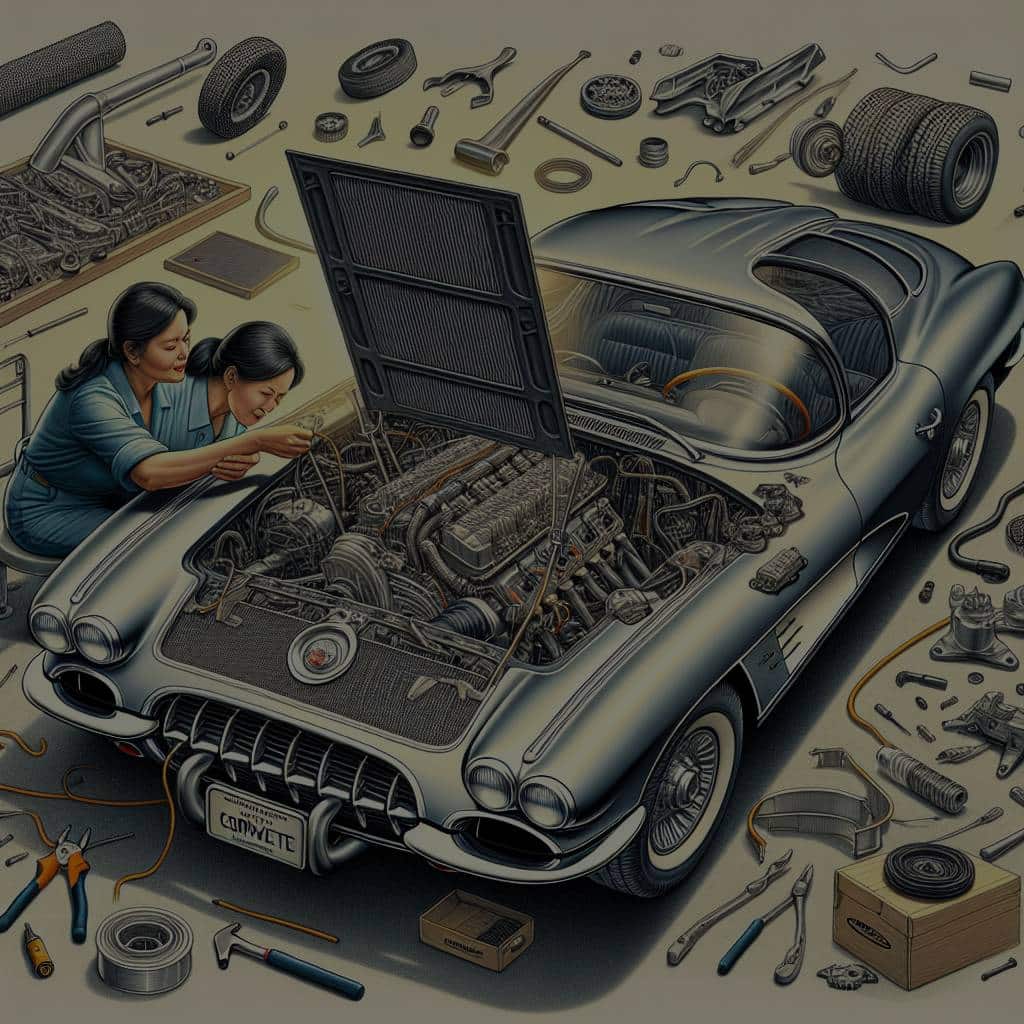Can an Aluminum Radiator Upgrade Prevent Overheating in a Classic Chevrolet Corvette?

The classic Chevrolet Corvette, with its finely-tuned engine and powerful performance, is a true automotive legend. But like any high-performance machine, it requires the right components to function optimally and efficiently. One key component is the radiator. The heart of the car’s cooling system, it helps keep the engine’s temperature at a safe level. But what happens when your Corvette’s radiator isn’t up to the task? In this article, we’ll explore the benefits of an aluminum radiator upgrade and examine if it can prevent overheating in your classic Chevrolet Corvette.
Understanding the Role of the Radiator in Your Car’s Engine Cooling System
Let’s start our journey by understanding the core function of the radiator in your car’s cooling system. The engine generates a large amount of heat while running. If left unchecked, this heat could potentially cause severe damage to the engine. That’s where the radiator comes into play.
Also to see : How to Select the Best High-Performance Brake Pads for a Track Day in an Audi R8?
The radiator, which is often filled with a coolant, cools down the hot liquid coming from the engine, and then returns it back to the engine cooler than before. It acts as a heat exchanger and works in tandem with other parts of the cooling system, such as the thermostat, fans, and water pump, to ensure the engine’s temperature remains within a safe range.
However, not all radiators are created equal. The core material of the radiator plays a significant role in its ability to dissipate heat.
Also to discover : How to Choose the Right Performance Tires for Autocross in a Mini Cooper JCW?
The Difference Between Aluminum and Traditional Radiators
Traditionally, radiators were made from brass or copper. While these materials have decent heat transfer properties, they are not as efficient as aluminum. Moreover, they are heavier, which can add unwanted weight to your car, especially if you enjoy a bit of speed.
Aluminum radiators, on the other hand, are lighter and more efficient at dissipating heat. Aluminum has a higher heat transfer rate than both brass and copper, meaning it can cool down hot coolant faster. Also, aluminum radiators typically have a larger core and more cooling fins per inch, which further enhances their cooling capacity.
Furthermore, aluminum radiators are more durable and resistant to corrosion, ensuring a longer lifespan. But does this all mean that an aluminum radiator upgrade can prevent your classic Chevrolet Corvette from overheating?
Upgrading Your Corvette’s Radiator to Aluminum: The Benefits
If your Corvette is experiencing high engine temperatures or frequent overheating, upgrading to an aluminum radiator could indeed be beneficial. As we’ve already noted, aluminum transfers heat more effectively than traditional materials. Hence, it can more efficiently keep your engine temperature in check, even in high-performance situations.
Also, an aluminum radiator can handle more coolant volume due to its larger core. A larger volume of coolant means that more heat can be absorbed from the engine and dissipated, reducing the risk of overheating.
Another benefit of aluminum radiators is their design flexibility. They can be built to fit almost any space, allowing for custom configurations. For example, you could choose a single-row radiator with a thick core or a dual-row radiator with a thinner core depending on your Corvette’s specific needs.
Things to Consider When Upgrading Your Radiator
While upgrading to an aluminum radiator can indeed help prevent overheating, it’s essential to pair this upgrade with other vital cooling system components. For instance, the cooling fans and thermostat must also be up to the task.
Cooling fans help increase the airflow through the radiator, helping to cool the coolant more quickly. Upgrading to high-performance fans can enhance this effect. Likewise, a properly functioning thermostat is critical for regulating the flow of coolant through the system. If it’s not working correctly, it could cause the engine to overheat, regardless of the type of radiator you have.
Finally, remember to always use the correct type of coolant in your Corvette. Different coolants have different boiling points and cooling efficiencies, so ensure you’re using one suitable for your car and environment.
So, will upgrading to an aluminum radiator prevent your classic Chevrolet Corvette from overheating? The answer is a resounding yes, as long as it’s paired with a well-maintained cooling system.
In Summary: The Power of Prevention with Aluminum
The beauty of the classic Chevrolet Corvette is not merely in its design but also in its performance. However, for your Corvette to perform at its best, its engine needs to maintain the right temperature. A radiator plays a crucial role in this, and upgrading to an aluminum one can significantly enhance your Corvette’s cooling efficiency.
An aluminum radiator dissipates heat more effectively, can hold more coolant, and is more durable and corrosion-resistant than traditional materials. This can contribute to lower engine temperatures and a reduced risk of overheating, particularly in high-performance situations. But remember, a radiator doesn’t work alone. To keep your Corvette running sleek and cool, be sure to also pay attention to the other components of your cooling system, such as the fans and thermostat.
So, if you’re dealing with persistent overheating issues in your classic Chevrolet Corvette, it’s worth considering an upgrade to an aluminum radiator. It could very well be the key to unlocking your Corvette’s maximum potential while safeguarding the heart of your classic car – the engine.
The Benefits and Drawbacks of Upgrading to an Aluminum Radiator
A key benefit of upgrading to an aluminum radiator, as we’ve already discussed, is its high efficiency in dissipating heat. Aluminum radiators have a greater heat transfer rate than their copper or brass counterparts, making them more effective at cooling down hot coolant rapidly. This, in turn, means they can potentially keep your Chevrolet Corvette’s engine temperature in check under high-performance conditions, thereby reducing the risk of overheating.
Additionally, aluminum radiators can handle a larger volume of coolant due to their bigger core. This increased capacity enables them to absorb and dissipate more heat from the engine, further decreasing the chances of overheating. Moreover, they are more durable and resistant to corrosion, which translates to a longer lifespan compared to brass or copper radiators.
However, while aluminum radiators offer considerable benefits, they are not without their drawbacks. For one, they can be more expensive than traditional radiators. Secondly, while they’re generally more durable, they can be more susceptible to damage from road debris due to their larger cores and fins.
How to Maximize the Efficiency of an Aluminum Radiator in a Classic Chevrolet Corvette
If you’ve decided to upgrade to an aluminum radiator for your Chevrolet Corvette, there are a few additional steps you can take to maximize its efficiency. One of these is adding an electric fan. An electric fan can enhance airflow through the radiator, helping to cool the coolant quicker and more effectively.
Another measure is to ensure that the radiator is installed correctly, with the right core support. The core support plays a vital role in stabilizing the radiator and ensuring optimal airflow. A poorly installed radiator can compromise its efficiency and potentially lead to overheating.
It’s also crucial to check the condition of your Corvette’s heater core. The heater core, like the radiator, is part of the car’s cooling system and contributes to maintaining the right engine temperature. A malfunctioning heater core can hinder the overall efficiency of the cooling system and should be addressed promptly.
Lastly, consider the climate and conditions in which you primarily drive your Corvette. In hot summer months, you might need a three-row aluminum radiator to handle the extra heat load. On the other hand, if you live in a cooler climate, a smaller two-row radiator might suffice.
Conclusion: Can an Aluminum Radiator Upgrade Prevent Overheating in Your Classic Chevrolet Corvette?
In conclusion, upgrading to an aluminum radiator can indeed have a positive impact on preventing your classic Chevrolet Corvette from overheating. Thanks to their high efficiency and capacity to handle more coolant, aluminum radiators are generally more effective at maintaining safe engine temperatures, especially in high-performance conditions.
However, a radiator upgrade should not be viewed as a standalone solution to overheating issues. It should be considered as part of a broader maintenance strategy that also addresses other components of the cooling system, including the fans, thermostat, and heater core.
As a Chevrolet Corvette owner, it’s also crucial to remember that different factors, such as weather conditions, driving habits, and the condition of the car, can impact its cooling needs. Therefore, a customized approach that takes into account your unique circumstances and needs will yield the best results.
So, while an aluminum radiator can certainly help, ensuring a well-maintained cooling system is equally, if not more, critical for preventing overheating in your classic Chevrolet Corvette. And in the end, preserving the integrity and performance of your cherished classic car is what it’s all about.
